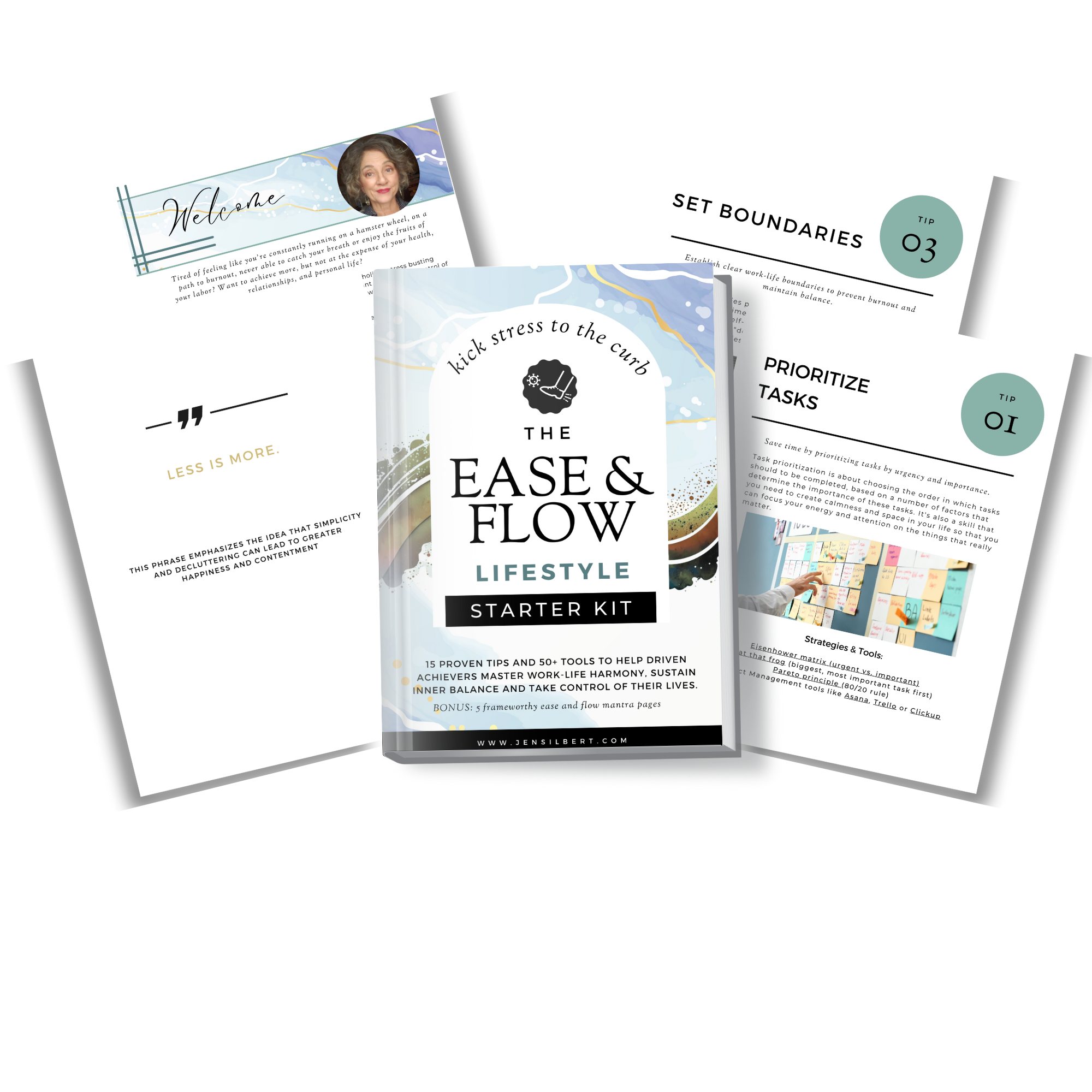"Can you do this for me?"
If that simple question strikes a chord of panic in you, or if you find yourself juggling countless obligations because you just can't say "no," this blog post is for you.
Learning to set boundaries and say "no" is a skill and an art form, and it can be a game-changer when it comes to your personal and professional growth.
In today's blog I want to:
- dive into the power of 'no.'
- demystify why saying 'no' often feels like climbing Mount Everest and explore the psychological factors at play.
- shine a light on the transformative power of boundaries, backed up with insights from key studies and books that have carved out new understandings in this field.
- discover what a life brimming with healthy boundaries looks like compared to one where boundaries are blurred or nonexistent.
- share 5 actionable tips that you can start using today to say 'no' with confidence and grace.
Through real-life scenarios, we'll discover what a life brimming with healthy boundaries looks like compared to one where boundaries are blurred or nonexistent.
Why Saying 'No' Can Be So Tough
Why do we struggle so much with a two-letter word? Why does it feeling climbing Mount Everest when holding off on another request for our time/money/space?
Saying 'no' can be difficult for a variety of reasons:
- Fear of Conflict: You worry that saying 'no' will cause disagreements or damage relationships.
- Guilt: This is a biggie! The guilt associated with letting someone down can be overwhelming.
- Desire to Please: People pleasing is very hard to change when it becomes a part of your identity. You're known for being that nice guy/girl. You really want to people to be happy. You may feel like saying "no" will seem selfish or uncaring.
- Fear of Missing Out (FOMO): You may struggle to decline opportunities because you're afraid you might miss out on something great. I mean, what if that offer is a once-in-a-lifetime opportunity?
A 2012 study published in the Journal of Consumer Research found that people who struggle to say 'no' are often motivated by a desire to please others, even at the expense of their own well-being.
This tendency to please others often stems from a deep-seated fear of rejection or a desire for acceptance and approval.
This can be traced back to our evolutionary past, where being part of a group was key to survival. It can be a coping mechanism developed in childhood where it made you feel safe.
Fast forward to today, this fear manifests itself in the form of people-pleasing behaviors. This is particularly prevalent in cultures that place a high value on harmony and consensus. It also explains why it is SO HARD to break free from people pleasing. It's a very powerful force entrenched in our pysche that takes courage to change.
However, always aiming to please others can lead to an unhealthy imbalance in your personal and professional life.
The price you pay can be steep. It can mean:
- overcommitting and upsetting work-life-health balance
- being taken advantage of
- neglecting your own needs
- stress
- resentment
- burnout
- physical and mental health issues
- lack of respect from others
Recognizing this is the first step towards change.
Remember, every time you say 'yes' to someone else without sincere willingness, you're potentially saying 'no' to yourself and your own needs and values.
Now, let's move on to explore the liberating world of healthy boundaries.
The Power of Boundaries
The concept of boundaries can be a bit elusive.
For some, the mere mention of the word "boundaries" might elicit feelings of restriction or limitations.
However, when we delve deeper, we begin to see that boundaries, in fact, create a sense of freedom and empowerment. They're the invisible lines we draw around ourselves to maintain balance and protect our energy. They're about understanding our limits and communicating them effectively to others. They're an essential aspect of self-care and self-respect.
But what do these boundaries really look like?

Let's clear up a common misconception right away: boundaries aren't walls. They are guidelines for how we want to be treated.
When we have clear boundaries, we understand and respect our needs, feelings, and abilities, and we communicate these clearly to others.
Books like "Boundaries: When to Say Yes, How to Say No To Take Control of Your Life" by Drs. Henry Cloud and John Townsend have popularized this concept. Establishing boundaries can reduce stress, improve relationships, and enhance self-esteem.
If you live without boundaries today, does it look something like this?...
- Work-Life Imbalance: You might find yourself constantly caught up in work even during your personal time. There's a high chance you're checking emails late at night or skipping family time to complete work tasks. You're perpetually exhausted but feel you can't say no to extra assignments. You're burning the candle at both ends, with work seeping into your leisure time.
- Difficult Relationships: In relationships, you may be bending over backward to meet your partner's demands, rarely voicing your needs or wants. You're always the one compromising and have a hard time asserting yourself. You feel taken for granted and sometimes, even disrespected.
- Stressful Social Life: Social situations can be a source of anxiety. You feel compelled to say yes to every invite, every favor asked, out of fear of letting people down. It's hard for you to excuse yourself from situations or gatherings that make you uncomfortable, and you often end up feeling drained.
- Emotional Turbulence: Emotionally, you may find yourself carrying everyone else's burdens. You feel responsible for other people's feelings and problems, which leaves you emotionally depleted. People who disrespect your time and feelings continue to be part of your life because you're unable to distance yourself from them.
- Neglected Health: You might be neglecting your health, skipping meals, not getting enough rest, or ignoring your body's signals for a break because you're too occupied meeting others' expectations. Your self-care is always on the back burner.
In a life without boundaries, you're constantly trying to keep everyone else happy, often at the expense of your own well-being.

Now, Imagine a life with boundaries:
- Work-Life Balance: You can strike a balance between work and personal life. You can dedicate your full attention to your job during work hours but also know when to switch off and not let work encroach on your personal time. You understand that it's perfectly acceptable to say no to extra work that is beyond your capacity or outside of working hours.
- Healthy Relationships: In relationships you can openly communicate your needs, wants, and limitations to their partner. You know that it's okay to need time alone, or to politely decline participation in activities you're not interested in. You can ask for what you need without fear of rejection or criticism.
- Social Settings: In social situations you can comfortably interact with others without feeling the need to please everyone or conform to what others are doing. You can choose to skip the party if you feel like it, or decide to leave early when you've had enough, without guilt.
- Emotional Stability: Emotionally, you don't take on other people's problems as your own. You can empathize and offer support, but you understand that you are not responsible for fixing others. You also avoid people who consistently violate your boundaries, cause drama, or who are overly demanding or critical.
- Physical Health: With good boundaries you don't let your health take a backseat. You know that saying no to some activities or demands means saying yes to your well-being. Regular exercise, adequate rest, and maintaining a balanced diet are non-negotiable for you.
Remember, setting boundaries is a way of communicating to others that you respect yourself, and it is a key element in developing self-confidence and self-esteem. With strong boundaries, life can be more balanced, fulfilling, and less stressful.
The Role of “NO”
Now that we have a clearer understanding of what boundaries are, and their power in our lives, you might be wondering: How do I effectively establish boundaries?
The truth is, the art of saying 'No' can often be a key part of setting healthy boundaries.
Saying 'No' allows you to preserve your energy, prevent resentment, and communicate your needs more effectively. Yet, saying 'No' can be challenging, especially if you are not used to doing so.
But don't worry, that's what we're here for.
Let's dive into these 5 tips for saying 'No' with confidence, and start shaping a life that aligns more closely with your needs and values.
Here are 5 tips for saying "NO" with confidence.

1. Value Your Time
Remember this: Your time is precious. It's one resource you can never get back once it's spent. So, think carefully before committing to something that you might later regret. Practice saying, "I’ll need to check my schedule" before automatically saying 'Yes'. This gives you the time and space to consider whether you can accommodate the request without compromising your personal boundaries.

2. Practice Assertiveness
Being assertive doesn't mean being aggressive. It means communicating your needs and wants clearly and respectfully. Practice phrases like "I understand you need my help, but I'm unable to commit to this at the moment" or "I appreciate your request, but I must decline as it doesn't align with my current priorities." Create your own script for different situations.

3. Offer an Alternative
If saying 'No' makes you feel guilty, offering an alternative can be a good compromise. If a friend asks for a favor you can’t commit to, you could suggest another friend who might be able to help. This shows that you care, while still maintaining your boundaries.

4. Realize you're saying 'No' to the request, not the person
This is an important distinction to make. You're not rejecting the person, just declining their request. This can help in maintaining relationships while also respecting your boundaries.

5. Remember: You don't need to justify your 'No'
You don't need to offer long-winded explanations for your decisions. A simple, respectful decline is enough. This might feel uncomfortable at first, but with practice, it becomes easier.
Saying 'no' doesn't make you a bad person. It makes you a confident person who respects their time and energy.
What's Next for You?
So, now what? You know your weak boundaries are inviting negative consequences in your life. You've learned there may be deeply ingrained conditioning at play. You see the path might be tough, but you're ready for change. What's next?
As a certified Emotional Intelligence Coach with years of experience, I understand the challenges you face in setting boundaries.
Navigating boundaries can be a challenging journey, but you're not alone. I help people overcome obstacles, such as difficulty saying 'No', every day.
Through personalized coaching sessions, I can provide strategies and techniques tailored to your needs and circumstances. We'll work together to strengthen your boundary-setting muscles, build your confidence, and improve your overall quality of life. Saying 'no' is not just about turning down requests – it's about saying 'yes' to a healthier, happier, more confident you!
The "Rise and Shine Confidence Coaching" program will help you explore the root causes of behaviors contributing to poor boundaries, help you work with your strengths and practice becoming more confident in just being you, as is, no people pleasing necessary. This is an 8 week program that gives you time to learn, process, and embody change so that you can reclaim control over your life. Let's chat to see if it's right for you!
Remember, your boundaries are essential for your well-being and self-confidence. So start practicing the art of saying 'No' today, and welcome a life of increased peace, control, and happiness. You deserve it!
Want to become a boundary-setting pro with optimal work-life harmony?
Get the FREE 23-page Ease and Flow Lifestyle Starter Kit, a holistic stress-busting guide with 15 proven tips and 50+ linked tools to help driven, busy professionals master work-life harmony, sustain inner balance and take control of their lives. Get it here.

